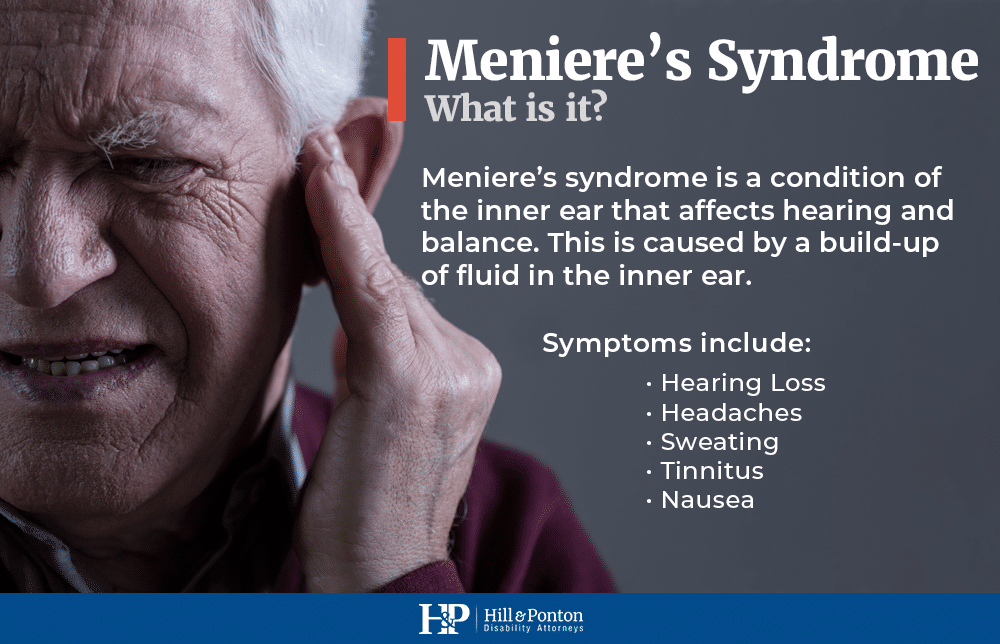Veterans experience higher rates of auditory illnesses than the general population. In fact, hearing loss and tinnitus are the most claimed disabilities by veterans. But there are other diseases of the ear that veterans may have, such as Meniere’s Disease.
What Is the VA Rating for Meniere’s Disease?
The VA disability rating for Meniere’s Disease is 30%, 60% or 100% depending on the frequency and severity of the symptoms. Meniere’s symptoms are a combination of vertigo (feeling dizzy or losing balance) with hearing loss and potentially other symptoms including tinnitus, headaches, nausea and sweating.
- 30% VA Disability Rating for Meniere’s Disease is assigned for hearing impairment with vertigo less than once a month, with tinnitus, or without tinnitus.
- 60% VA Disability Rating for Meniere’s Disease is assigned for hearing impairment with attacks of vertigo and cerebellar gait occurring from one to four times a month, with tinnitus, or without tinnitus as well.
- 100% VA Disability Rating for Meniere’s Disease is assigned for hearing impairment with attacks of vertigo and cerebellar gait occurring more than once weekly, with tinnitus, or without tinnitus.
A medical opinion from an audiologist linking your diagnosis to an incident in service may be beneficial in supporting your claim. This medical evidence will show that you are experiencing hearing impairment and other inner ear difficulties that can hinder your ability to work and complete daily tasks. Based on this evidence, you will receive a VA disability rating for your condition. This rating affects your VA benefits directly.
Meniere’s Disease Explained
Meniere’s syndrome, or Meniere’s disease, is a condition of the inner ear that affects hearing and balance. Meniere’s syndrome is a disorder of the inner ear that is caused by a fluid build-up in the labyrinth, a part of the inner ear. The labyrinth houses structures that support hearing and balance, far past where hearing aids would touch inside the ear. The elevated fluid build-up interferes with nerve signals to the brain which later causes recurring vertigo and hearing impairment. As a disclaimer, keep in mind that this condition is chronic and does not currently have a cure.
Vertigo is one of the more prevalent symptoms of Meniere’s syndrome and for some can be extremely disabling. Vertigo is similar to a dizzy spell. Attacks of vertigo feel like the room is spinning or like you are unbalanced. This symptom can last for 20 minutes or as long as 24 hours. You may experience these attacks once a month or multiple times a day, as frequency can vary.
These symptoms may be so severe that they hinder daily activities or your ability to work. Other symptoms of Meniere’s syndrome include hearing loss, tinnitus or ringing in the ears, headaches, nausea and sweating.
The exact cause of Meniere’s syndrome is unknown but some researchers believe noise exposure or environmental factors, i.e. exposure to jet fuel, or other related viral infections could be a cause. This would make active duty military veterans particularly susceptible to this condition and therefore higher qualifying for the long term disability.

Common Symptoms of Meniere’s Syndrome
- vertigo (feeling dizzy or losing balance)
- hearing loss
- headaches
- sweating
- tinnitus
- nausea.
- And more
If you are experiencing a combination of the symptoms discussed, please let your health care provider know and request to be evaluated for Meniere’s disease. A diagnosis of Meniere can involve vestibular tests but is fairly simple to do. An audiometric exam (audiometry) is needed to establish a diagnosis for Meniere’s disease.
An audiometric exam tests for hearing loss and other diseases of the ear like Meniere’s disease that can affect the disturbed function of vestibular labyrinth. The testing typically consists of two parts: a speech discrimination test and a pure-tone test. A speech discrimination test determines your ability to differentiate words. A pure-tone test is a type of hearing test that evaluates your ability to hear sounds at different frequencies and volumes (No x-rays involved).
In addition, your health care provider may ask questions about your other symptoms and medical conditions. They may ask about the frequency and length of time you experience vertigo, dizziness and/or loss of balance prior to your test results. Your answers to these questions will help them properly diagnosis you and determine the severity of your condition as well as your eligibility for a VA disability rating. Therefore, it is very important for you to vocalize your symptoms and explain what you are experiencing as clearly as possible.
Establishing Service Connection for Meniere’s Disease
If you are living with Meniere’s disease or another ear condition it can be difficult to work. This is often due to the risk of losing your balance which is a risk factor along with hearing impairment. Other ear conditions with this effect may include chronic suppurative otitis media, chronic otitis externa, and chronic nonsuppurative otitis media. Veterans who are unable to work due to Meniere’s disease and similar conditions can file a VA disability claim for veterans benefits. Proving factors like individual unemployability and service connection will be key to receiving the appropriate compensation for your condition.
In order to receive VA disability benefits for this condition and other ear conditions, it’s important to first prove military service connection. The issue cannot have been caused by sedentary work. To successfully establish service connection for conditions like Meniere’s disease, a current diagnosis, you will need evidence of an in-service incident or stressor and nexus statement connecting your current disability to the in-service event. You will need service medical records detailing instances of vertigo, dizziness or dizzy spells, loss of hearing and fainting, and statements for fellow servicemen, family, or friends that confirm the noise exposure and the symptoms you’ve experienced as a consequence of this exposure.
Filing VA Disability Claims for Ear Conditions
If you have been diagnosed with Meniere’s disease or believe that you suffer from Meniere’s disease, as a result of your time in service, you can file a claim for disability with the Veteran’s Administration by visiting their website. You can also hire a VA disability attorney to help you with your claim and determining your residual functional capacity (RFC).
Our attorneys are dedicated to working with former service members, so veterans can obtain the disability compensation they deserve. If your disability claim for Meniere’s Disease has been denied, contact us today for a free case evaluation.



